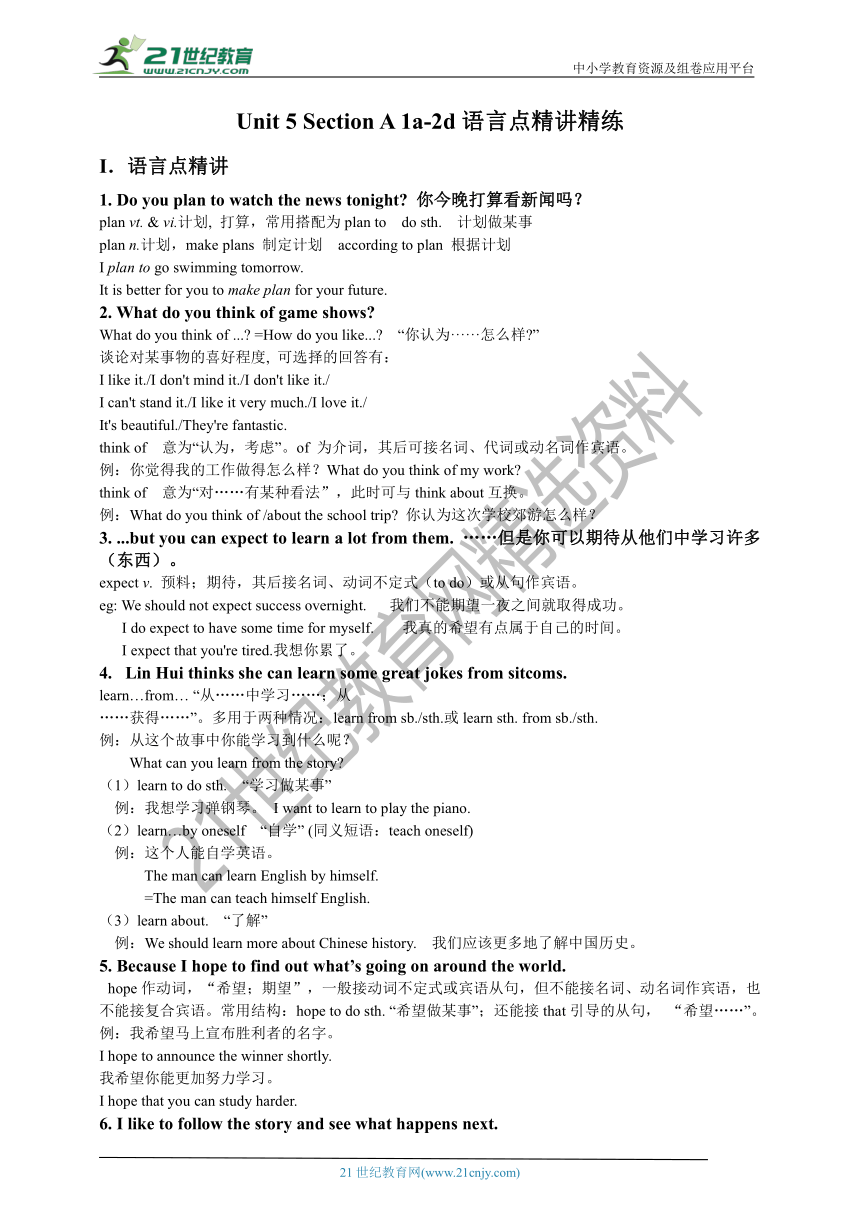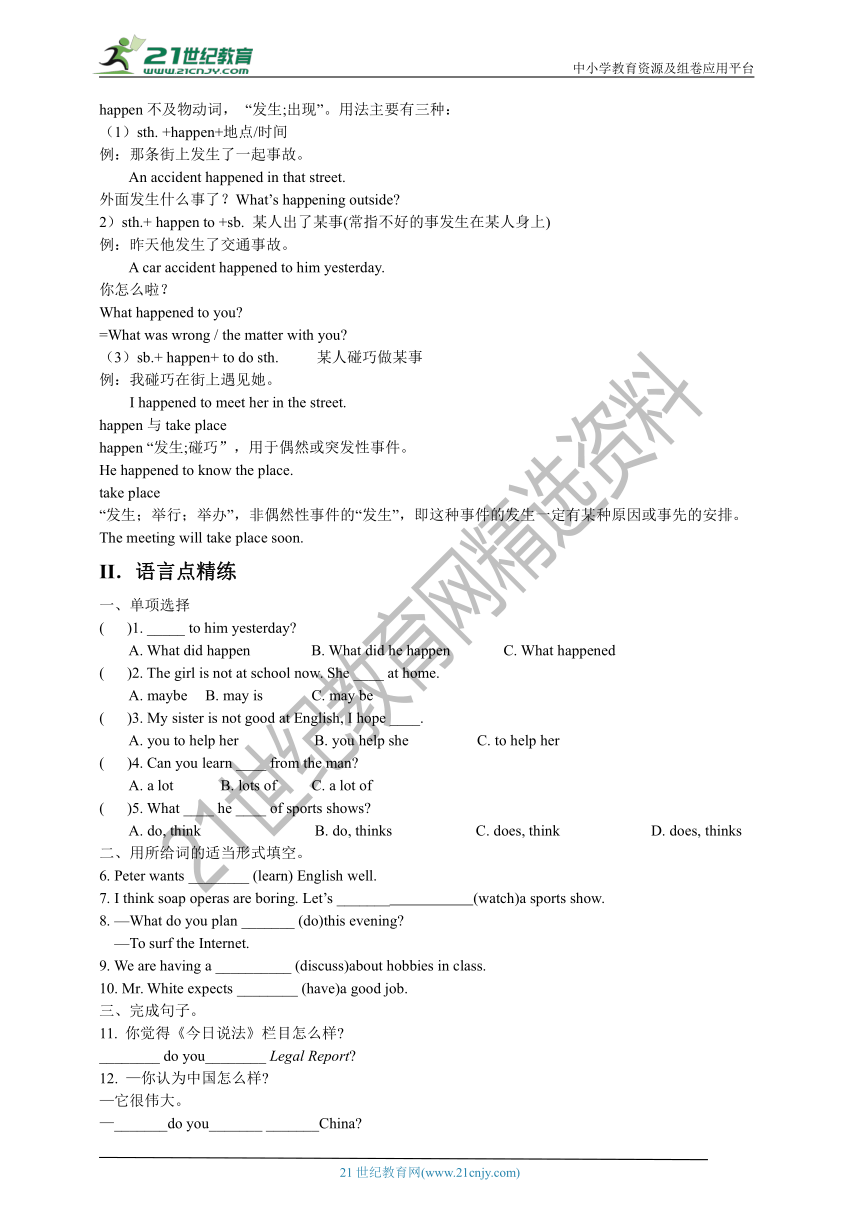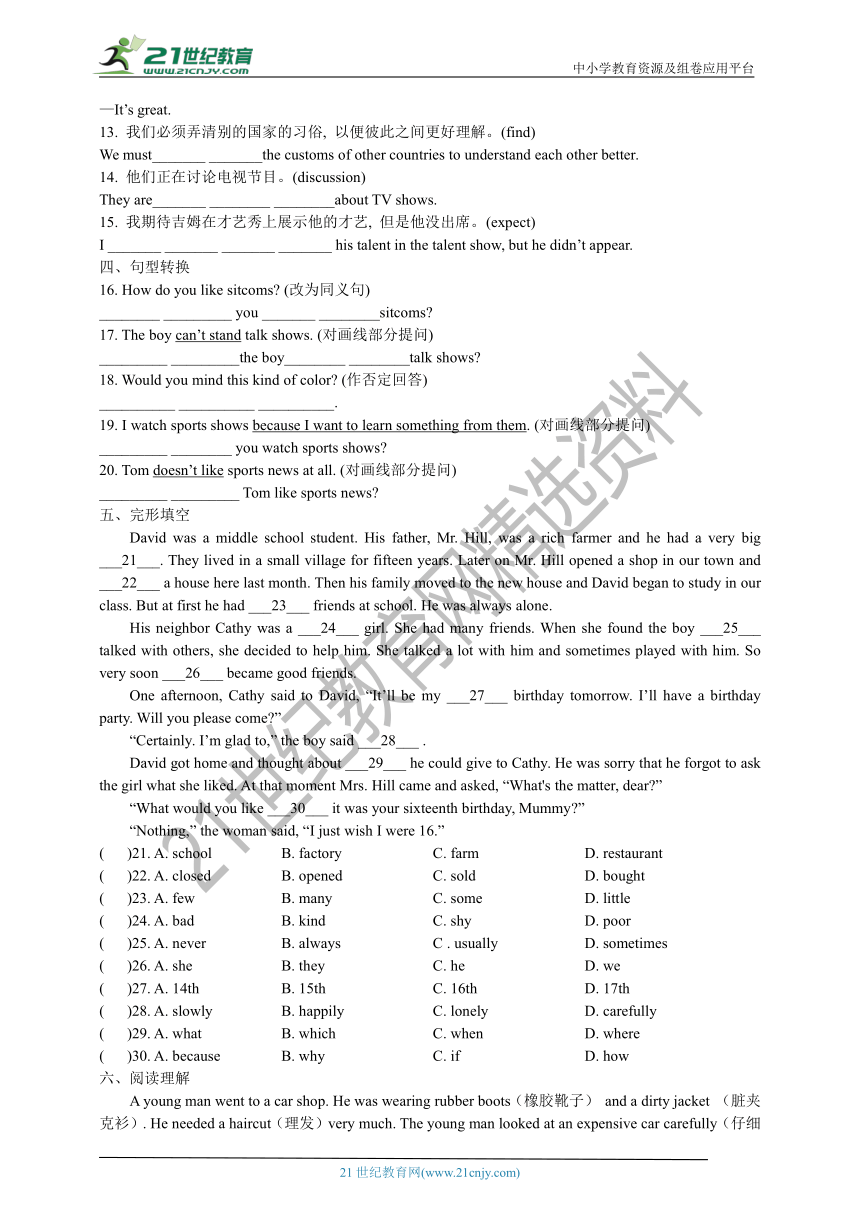(新课标)Unit 5 Do you want to watch a game show SectionA 1a-2d 语言点精讲精练(含答案)
文档属性
| 名称 | (新课标)Unit 5 Do you want to watch a game show SectionA 1a-2d 语言点精讲精练(含答案) |  | |
| 格式 | zip | ||
| 文件大小 | 1.3MB | ||
| 资源类型 | 试卷 | ||
| 版本资源 | 人教新目标(Go for it)版 | ||
| 科目 | 英语 | ||
| 更新时间 | 2022-10-11 07:10:32 | ||
图片预览



文档简介
中小学教育资源及组卷应用平台
Unit 5 Section A 1a-2d语言点精讲精练
I.语言点精讲
1. Do you plan to watch the news tonight 你今晚打算看新闻吗?
plan vt. & vi.计划, 打算,常用搭配为plan to do sth. 计划做某事
plan n.计划,make plans 制定计划 according to plan 根据计划
I plan to go swimming tomorrow.
It is better for you to make plan for your future.
2. What do you think of game shows
What do you think of ... =How do you like... “你认为······怎么样 ”
谈论对某事物的喜好程度, 可选择的回答有:
I like it./I don't mind it./I don't like it./
I can't stand it./I like it very much./I love it./
It's beautiful./They're fantastic.
think of 意为“认为,考虑”。of 为介词,其后可接名词、代词或动名词作宾语。
例:你觉得我的工作做得怎么样?What do you think of my work
think of 意为“对……有某种看法”,此时可与think about互换。
例:What do you think of /about the school trip 你认为这次学校郊游怎么样?
3. ...but you can expect to learn a lot from them. ……但是你可以期待从他们中学习许多(东西)。
expect v. 预料;期待,其后接名词、动词不定式(to do)或从句作宾语。
eg: We should not expect success overnight. 我们不能期望一夜之间就取得成功。
I do expect to have some time for myself. 我真的希望有点属于自己的时间。
I expect that you're tired.我想你累了。
4. Lin Hui thinks she can learn some great jokes from sitcoms.
learn…from… “从……中学习……;从
……获得……”。多用于两种情况:learn from sb./sth.或learn sth. from sb./sth.
例:从这个故事中你能学习到什么呢?
What can you learn from the story
(1)learn to do sth. “学习做某事”
例:我想学习弹钢琴。 I want to learn to play the piano.
(2)learn…by oneself “自学” (同义短语:teach oneself)
例:这个人能自学英语。
The man can learn English by himself.
=The man can teach himself English.
(3)learn about. “了解”
例:We should learn more about Chinese history. 我们应该更多地了解中国历史。
5. Because I hope to find out what’s going on around the world.
hope作动词,“希望;期望”,一般接动词不定式或宾语从句,但不能接名词、动名词作宾语,也不能接复合宾语。常用结构:hope to do sth. “希望做某事”;还能接that引导的从句, “希望……”。
例:我希望马上宣布胜利者的名字。
I hope to announce the winner shortly.
我希望你能更加努力学习。
I hope that you can study harder.
6. I like to follow the story and see what happens next.
happen不及物动词, “发生;出现”。用法主要有三种:
(1)sth. +happen+地点/时间
例:那条街上发生了一起事故。
An accident happened in that street.
外面发生什么事了?What’s happening outside
2)sth.+ happen to +sb. 某人出了某事(常指不好的事发生在某人身上)
例:昨天他发生了交通事故。
A car accident happened to him yesterday.
你怎么啦?
What happened to you
=What was wrong / the matter with you
(3)sb.+ happen+ to do sth. 某人碰巧做某事
例:我碰巧在街上遇见她。
I happened to meet her in the street.
happen与take place
happen “发生;碰巧”,用于偶然或突发性事件。
He happened to know the place.
take place
“发生;举行;举办”,非偶然性事件的“发生”,即这种事件的发生一定有某种原因或事先的安排。
The meeting will take place soon.
II.语言点精练
一、单项选择
( )1. _____ to him yesterday
A. What did happen B. What did he happen C. What happened
( )2. The girl is not at school now. She ____ at home.
A. maybe B. may is C. may be
( )3. My sister is not good at English, I hope ____.
A. you to help her B. you help she C. to help her
( )4. Can you learn ____ from the man
A. a lot B. lots of C. a lot of
( )5. What ____ he ____ of sports shows
A. do, think B. do, thinks C. does, think D. does, thinks
二、用所给词的适当形式填空。
6. Peter wants ________ (learn) English well.
7. I think soap operas are boring. Let’s _______ (watch)a sports show.
8. —What do you plan _______ (do)this evening
—To surf the Internet.
9. We are having a __________ (discuss)about hobbies in class.
10. Mr. White expects ________ (have)a good job.
三、完成句子。
11. 你觉得《今日说法》栏目怎么样
________ do you________ Legal Report
12. —你认为中国怎么样
—它很伟大。
—_______do you_______ _______China
—It’s great.
13. 我们必须弄清别的国家的习俗, 以便彼此之间更好理解。(find)
We must_______ _______the customs of other countries to understand each other better.
14. 他们正在讨论电视节目。(discussion)
They are_______ ________ ________about TV shows.
15. 我期待吉姆在才艺秀上展示他的才艺, 但是他没出席。(expect)
I _______ _______ _______ _______ his talent in the talent show, but he didn’t appear.
四、句型转换
16. How do you like sitcoms (改为同义句)
________ _________ you _______ ________sitcoms
17. The boy can’t stand talk shows. (对画线部分提问)
_________ _________the boy________ ________talk shows
18. Would you mind this kind of color (作否定回答)
__________ __________ __________.
19. I watch sports shows because I want to learn something from them. (对画线部分提问)
_________ ________ you watch sports shows
20. Tom doesn’t like sports news at all. (对画线部分提问)
_________ _________ Tom like sports news
五、完形填空
David was a middle school student. His father, Mr. Hill, was a rich farmer and he had a very big ___21___. They lived in a small village for fifteen years. Later on Mr. Hill opened a shop in our town and ___22___ a house here last month. Then his family moved to the new house and David began to study in our class. But at first he had ___23___ friends at school. He was always alone.
His neighbor Cathy was a ___24___ girl. She had many friends. When she found the boy ___25___ talked with others, she decided to help him. She talked a lot with him and sometimes played with him. So very soon ___26___ became good friends.
One afternoon, Cathy said to David, “It’ll be my ___27___ birthday tomorrow. I’ll have a birthday party. Will you please come ”
“Certainly. I’m glad to,” the boy said ___28___ .
David got home and thought about ___29___ he could give to Cathy. He was sorry that he forgot to ask the girl what she liked. At that moment Mrs. Hill came and asked, “What's the matter, dear ”
“What would you like ___30___ it was your sixteenth birthday, Mummy ”
“Nothing,” the woman said, “I just wish I were 16.”
( )21. A. school B. factory C. farm D. restaurant
( )22. A. closed B. opened C. sold D. bought
( )23. A. few B. many C. some D. little
( )24. A. bad B. kind C. shy D. poor
( )25. A. never B. always C . usually D. sometimes
( )26. A. she B. they C. he D. we
( )27. A. 14th B. 15th C. 16th D. 17th
( )28. A. slowly B. happily C. lonely D. carefully
( )29. A. what B. which C. when D. where
( )30. A. because B. why C. if D. how
六、阅读理解
A young man went to a car shop. He was wearing rubber boots(橡胶靴子) and a dirty jacket (脏夹克衫). He needed a haircut(理发)very much. The young man looked at an expensive car carefully(仔细地)and then asked the shop owner(店主),“How much is this car ” “Nine thousand two hundred and eighteen,” the owner answered. “I want sixteen of them,” the young man said. The shop owner smiled coldly. He showed the door to the young man.
In another shop on the other side of the street the business was done(生意做成了). The young man took money out of his pocket and paid for the cars. He said the cars were for himself and his friends. Each of them wanted to get one. He said that he and his friends working on a fishing-boat. “We have got much money this season,” the young man said, “and we want to buy cars.”
( )31. The shop owner showed the young man the door means________
A. to ask him to go away
B. to ask him to look at the door of the car
C. to tell him where the door of the shop was
D. to let him enjoy the beautiful door of the car
( )32. How many cars did the young man want to buy for his friends
A. 18. B. 17. C. 16. D. 15.
( )33. How much did the young man pay for the cars
A. 9218. B. 92180. C. 147488. D. 138270.
( )34. —What was the young man —He was a________.
A. bank clerk B. school teacher C. shop owner D. fisherman
( )35. The story tries to tell us________.
A. we can’t tell whether(是否)a man is rich by(根据)his clothes
B. cars are expensive
C. people wearing rubber boots are rich
D. we can’t show the door to others
II. 语言点精练参考答案
一、1-5 CCCAC
二、6. to learn 7. Watch 8. to do 9. discussion 10. to have
三、11. How;like 12. What;think;of 13. find;out 4. having;a;discussion
15. expected;Jim;to;show
四、16. What;do;think;of 17. What;does;think;of 18. Not;at;all/Of;course;not
19. Why;do 20. How;does
五、21-2CDABA 26-30 BCBAC
六、31-35 ADCDA
21世纪教育网 www.21cnjy.com 精品试卷·第 2 页 (共 2 页)
HYPERLINK "http://www.21cnjy.com/" 21世纪教育网(www.21cnjy.com)
Unit 5 Section A 1a-2d语言点精讲精练
I.语言点精讲
1. Do you plan to watch the news tonight 你今晚打算看新闻吗?
plan vt. & vi.计划, 打算,常用搭配为plan to do sth. 计划做某事
plan n.计划,make plans 制定计划 according to plan 根据计划
I plan to go swimming tomorrow.
It is better for you to make plan for your future.
2. What do you think of game shows
What do you think of ... =How do you like... “你认为······怎么样 ”
谈论对某事物的喜好程度, 可选择的回答有:
I like it./I don't mind it./I don't like it./
I can't stand it./I like it very much./I love it./
It's beautiful./They're fantastic.
think of 意为“认为,考虑”。of 为介词,其后可接名词、代词或动名词作宾语。
例:你觉得我的工作做得怎么样?What do you think of my work
think of 意为“对……有某种看法”,此时可与think about互换。
例:What do you think of /about the school trip 你认为这次学校郊游怎么样?
3. ...but you can expect to learn a lot from them. ……但是你可以期待从他们中学习许多(东西)。
expect v. 预料;期待,其后接名词、动词不定式(to do)或从句作宾语。
eg: We should not expect success overnight. 我们不能期望一夜之间就取得成功。
I do expect to have some time for myself. 我真的希望有点属于自己的时间。
I expect that you're tired.我想你累了。
4. Lin Hui thinks she can learn some great jokes from sitcoms.
learn…from… “从……中学习……;从
……获得……”。多用于两种情况:learn from sb./sth.或learn sth. from sb./sth.
例:从这个故事中你能学习到什么呢?
What can you learn from the story
(1)learn to do sth. “学习做某事”
例:我想学习弹钢琴。 I want to learn to play the piano.
(2)learn…by oneself “自学” (同义短语:teach oneself)
例:这个人能自学英语。
The man can learn English by himself.
=The man can teach himself English.
(3)learn about. “了解”
例:We should learn more about Chinese history. 我们应该更多地了解中国历史。
5. Because I hope to find out what’s going on around the world.
hope作动词,“希望;期望”,一般接动词不定式或宾语从句,但不能接名词、动名词作宾语,也不能接复合宾语。常用结构:hope to do sth. “希望做某事”;还能接that引导的从句, “希望……”。
例:我希望马上宣布胜利者的名字。
I hope to announce the winner shortly.
我希望你能更加努力学习。
I hope that you can study harder.
6. I like to follow the story and see what happens next.
happen不及物动词, “发生;出现”。用法主要有三种:
(1)sth. +happen+地点/时间
例:那条街上发生了一起事故。
An accident happened in that street.
外面发生什么事了?What’s happening outside
2)sth.+ happen to +sb. 某人出了某事(常指不好的事发生在某人身上)
例:昨天他发生了交通事故。
A car accident happened to him yesterday.
你怎么啦?
What happened to you
=What was wrong / the matter with you
(3)sb.+ happen+ to do sth. 某人碰巧做某事
例:我碰巧在街上遇见她。
I happened to meet her in the street.
happen与take place
happen “发生;碰巧”,用于偶然或突发性事件。
He happened to know the place.
take place
“发生;举行;举办”,非偶然性事件的“发生”,即这种事件的发生一定有某种原因或事先的安排。
The meeting will take place soon.
II.语言点精练
一、单项选择
( )1. _____ to him yesterday
A. What did happen B. What did he happen C. What happened
( )2. The girl is not at school now. She ____ at home.
A. maybe B. may is C. may be
( )3. My sister is not good at English, I hope ____.
A. you to help her B. you help she C. to help her
( )4. Can you learn ____ from the man
A. a lot B. lots of C. a lot of
( )5. What ____ he ____ of sports shows
A. do, think B. do, thinks C. does, think D. does, thinks
二、用所给词的适当形式填空。
6. Peter wants ________ (learn) English well.
7. I think soap operas are boring. Let’s _______ (watch)a sports show.
8. —What do you plan _______ (do)this evening
—To surf the Internet.
9. We are having a __________ (discuss)about hobbies in class.
10. Mr. White expects ________ (have)a good job.
三、完成句子。
11. 你觉得《今日说法》栏目怎么样
________ do you________ Legal Report
12. —你认为中国怎么样
—它很伟大。
—_______do you_______ _______China
—It’s great.
13. 我们必须弄清别的国家的习俗, 以便彼此之间更好理解。(find)
We must_______ _______the customs of other countries to understand each other better.
14. 他们正在讨论电视节目。(discussion)
They are_______ ________ ________about TV shows.
15. 我期待吉姆在才艺秀上展示他的才艺, 但是他没出席。(expect)
I _______ _______ _______ _______ his talent in the talent show, but he didn’t appear.
四、句型转换
16. How do you like sitcoms (改为同义句)
________ _________ you _______ ________sitcoms
17. The boy can’t stand talk shows. (对画线部分提问)
_________ _________the boy________ ________talk shows
18. Would you mind this kind of color (作否定回答)
__________ __________ __________.
19. I watch sports shows because I want to learn something from them. (对画线部分提问)
_________ ________ you watch sports shows
20. Tom doesn’t like sports news at all. (对画线部分提问)
_________ _________ Tom like sports news
五、完形填空
David was a middle school student. His father, Mr. Hill, was a rich farmer and he had a very big ___21___. They lived in a small village for fifteen years. Later on Mr. Hill opened a shop in our town and ___22___ a house here last month. Then his family moved to the new house and David began to study in our class. But at first he had ___23___ friends at school. He was always alone.
His neighbor Cathy was a ___24___ girl. She had many friends. When she found the boy ___25___ talked with others, she decided to help him. She talked a lot with him and sometimes played with him. So very soon ___26___ became good friends.
One afternoon, Cathy said to David, “It’ll be my ___27___ birthday tomorrow. I’ll have a birthday party. Will you please come ”
“Certainly. I’m glad to,” the boy said ___28___ .
David got home and thought about ___29___ he could give to Cathy. He was sorry that he forgot to ask the girl what she liked. At that moment Mrs. Hill came and asked, “What's the matter, dear ”
“What would you like ___30___ it was your sixteenth birthday, Mummy ”
“Nothing,” the woman said, “I just wish I were 16.”
( )21. A. school B. factory C. farm D. restaurant
( )22. A. closed B. opened C. sold D. bought
( )23. A. few B. many C. some D. little
( )24. A. bad B. kind C. shy D. poor
( )25. A. never B. always C . usually D. sometimes
( )26. A. she B. they C. he D. we
( )27. A. 14th B. 15th C. 16th D. 17th
( )28. A. slowly B. happily C. lonely D. carefully
( )29. A. what B. which C. when D. where
( )30. A. because B. why C. if D. how
六、阅读理解
A young man went to a car shop. He was wearing rubber boots(橡胶靴子) and a dirty jacket (脏夹克衫). He needed a haircut(理发)very much. The young man looked at an expensive car carefully(仔细地)and then asked the shop owner(店主),“How much is this car ” “Nine thousand two hundred and eighteen,” the owner answered. “I want sixteen of them,” the young man said. The shop owner smiled coldly. He showed the door to the young man.
In another shop on the other side of the street the business was done(生意做成了). The young man took money out of his pocket and paid for the cars. He said the cars were for himself and his friends. Each of them wanted to get one. He said that he and his friends working on a fishing-boat. “We have got much money this season,” the young man said, “and we want to buy cars.”
( )31. The shop owner showed the young man the door means________
A. to ask him to go away
B. to ask him to look at the door of the car
C. to tell him where the door of the shop was
D. to let him enjoy the beautiful door of the car
( )32. How many cars did the young man want to buy for his friends
A. 18. B. 17. C. 16. D. 15.
( )33. How much did the young man pay for the cars
A. 9218. B. 92180. C. 147488. D. 138270.
( )34. —What was the young man —He was a________.
A. bank clerk B. school teacher C. shop owner D. fisherman
( )35. The story tries to tell us________.
A. we can’t tell whether(是否)a man is rich by(根据)his clothes
B. cars are expensive
C. people wearing rubber boots are rich
D. we can’t show the door to others
II. 语言点精练参考答案
一、1-5 CCCAC
二、6. to learn 7. Watch 8. to do 9. discussion 10. to have
三、11. How;like 12. What;think;of 13. find;out 4. having;a;discussion
15. expected;Jim;to;show
四、16. What;do;think;of 17. What;does;think;of 18. Not;at;all/Of;course;not
19. Why;do 20. How;does
五、21-2CDABA 26-30 BCBAC
六、31-35 ADCDA
21世纪教育网 www.21cnjy.com 精品试卷·第 2 页 (共 2 页)
HYPERLINK "http://www.21cnjy.com/" 21世纪教育网(www.21cnjy.com)
同课章节目录
- Unit 1 Where did you go on vacation?
- Section A
- Section B
- Unit 2 How often do you exercise?
- Section A
- Section B
- Unit 3 I'm more outgoing than my sister.
- Section A
- Section B
- Unit 4 What's the best movie theater?
- Section A
- Section B
- Unit 5 Do you want to watch a game show?
- Section A
- Section B
- Unit 6 I'm going to study computer science.
- Section A
- Section B
- Unit 7 Will people have robots?
- Section A
- Section B
- Unit 8 How do you make a banana milk shake?
- Section A
- Section B
- Unit 9 Can you come to my party?
- Section A
- Section B
- Unit 10 If you go to the party, you'll have a grea
- Section A
- Section B
